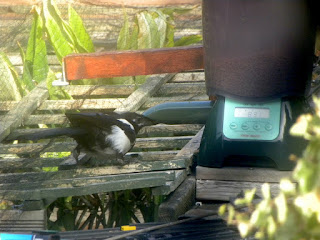The Thieving Magpies (With Apologies To Rossini)
We have a large fish pond in the garden, with various types of multi-coloured fish - none was expensive, and we started off with about half a dozen, but we reckon they must be really happy there, because over the years they have produced lots of fry.
We also feed a couple of stray cats: Snowy 1 and Snowy 2 (an older cat, who is now called "Old Deuteronomy) and they have a food bowl outside the kitchen door. When they have finished a couple of sachets of food in gravy or jelly, they also get a second course of Whiskers, which is dry cat food - they love both sorts, but by the time they get to the Whiskers, the cats are usually pretty satisfied, and quite often leave some of the pellets behind.
Once they have gone to start washing and grooming themselves, that is a signal to the magpies; they swiftly swoop down to collect anything that's left over, and clear the bowls so quickly, you'd think they hadn't had anything else in the way of food for ages.
Of course, when they have nested and have young, the parents are particularly busy, making umpteen return trips to the bowls: grab a morsel, fly away, and a couple of minutes later, come back for more. It is wonderful to see them, and their luminescent plumage shining in the sun, with their energetic work never ceasing.
To go back to the fish, and our efforts to make sure they are well fed if we have to go away: We invested in a rather clever device, with a spout that sits over the water in the pond, and when the hopper is filled with a goodly supply of pond sticks, there is a timer that releases a metered amount of food, three times a day.
Magpies are such intelligent birds and, just recently, have discovered this source of fine dining as well!
One bird's technique is to stick its beak right into the spout that delivers the pond sticks; this clearly works quite well!
However, today we saw the first magpie joined by a second, who had worked out an even more superior method of securing a meal. Apart from employing the "beak in the spout" technique, it then withdraws its head, and taps hard on the top of the dispenser, thus ensuring any stray pond sticks left higher up in the system with be delivered into the spout.
"I think this will be a good place to aim a sharp tap with my beak!"
I know birds are brilliant, but to see such learned behaviour right in front of our eyes, just a few feet away, is truly inspiring.
Reward!
Making sure they have food to tide them over feeding their young when the ground is bone dry, and I guess natural food hard to come by, is one thing; but with magpies also enjoying their "thievish" reputation, I'll be certain not to leave anything shiny or valuable around, in case that also takes their fancy!
There are so many superstitions surrounding magpies; in Europe they are mostly unfavourable, whilst in Asian countries they are considered good luck! I prefer to follow the latter option, but I knew people who would always show respect for magpies, by saluting any bird they saw.
It is also said that magpies mate for life, which gives an explanation for the first two lines of this old poem/nursery rhyme: a single magpie has lost its mate - or has yet to find one - but two magpies are united in happiness.
One for sorrow,
Two for joy,
Three for a girl,
Four for a boy,
Five for silver,
Six for gold,
Seven for a secret,
Never to be told.



No comments:
Post a Comment